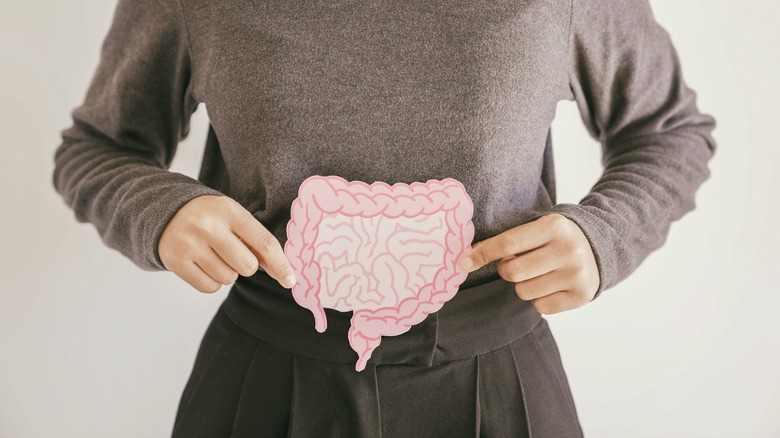Why Narrow Poop Could Be A Serious Warning Sign
Your poop health is not just about being regular. How your poop looks, how it smells, and its texture can all be of importance. For instance, something that causes your poop to turn green might include a leafy green vegetable like spinach in your diet. Consuming green-flavored food or taking iron supplements can have the same effect. If your poop won't flush, that's a warning sign that you're dealing with malabsorption.
What about narrow poop? Poop that's so thin that it makes you do a double-take to see if you actually did have a bowel movement (or something else) that morning. According to gastroenterologist and author of "Whats Your Poo Telling You?" author Dr. Anish Sheth (per Men's Journal), a less serious reason for really thin stools could be a lack of fiber in your diet. Fiber makes you poop; a lack of it could lead to constipation. When you're exerting pressure to pass what little stool can and does come out, however, your rectal sphincter muscles can tighten up. This can lead to the poop opening becoming smaller than usual and a resulting narrow bowel movement. "The theory here is that you have a small volume, and you're really straining to expel that bowel movement as opposed to just relaxing," explained Dr. Sheth. But sometimes, really thin stools can be a sign of blockage or even rectal cancer.
How is narrow poop connected to blockage or cancer?
Pencil-thin poop could be a sign that there's a narrowing in your colon or a blockage, explained gastroenterologist Dr. Elizabeth Rajan (via Mayo Clinic).
Your colon can narrow for a few different reasons, like diverticular disease, inflammatory bowel disease (IBD), ischemic colitis, radiation-induced colitis, anastomotic strictures, hernias, bacterial infections, and reduced blood flow to the area, also known as ischemia. Sometimes, it can happen because of rectal or colon cancer. With colon cancer, a tumor could be taking up space in your colon and restricting the passage of stool, resulting in narrow poop.
"Irritable bowel syndrome (IBS) also may cause changes in the size of your stools. IBS can cause stools to be smaller, larger or narrower than usual. It also causes changes in the consistency of stools," added Dr. Rajan. However, health conditions that cause super-thin poop won't only cause stool-related symptoms. There are other warning signs to watch out for as well.
When is super thin poop a cause for concern?
Time can be a good indicator, per Dr. Anish Sheth (via Men's Journal). "When it's persistent and progressive, which means it's been going on for weeks, or even months, and the stool is gradually becoming more narrow, that's when you get concerned about rectal cancer or something that's blocking the bottom portion of your intestines," shared the physician.
Bowel diseases like IBD and IBS also present with other symptoms, like diarrhea, rectal bleeding, bloating, stomach pain, cramping, pain while pooping, unexplained weight loss, and fatigue. Colon cancer causes other changes in your poop habits too, like diarrhea and constipation. Stomach pain, unexplained weight loss, bloody stool, and tiredness are warning signs as well. Diverticular diseases have similar symptoms. With abdominal hernias, constipation can accompany narrow stools. Severe stomach pain, an inability to pass gas, vomiting, feeling like your abdomen is swollen, and loud noises from your abdomen can mean that the hernia has caused intestinal or bowel obstruction. This is a medical emergency.
Looking in the toilet bowl every once in a while is a good practice, but so is assessing other symptoms. If you notice anything amiss, make an appointment with your doctor. A digital rectal examination, stool tests, blood tests, abdominal x-rays or ultrasounds, endoscopies, and colonoscopies can all be on the cards when it comes to determining the cause. Treatment would depend on the health condition that's causing the pencil-thin bowel movements.



